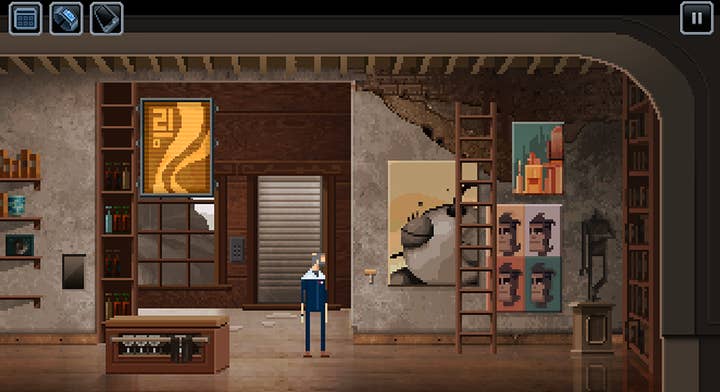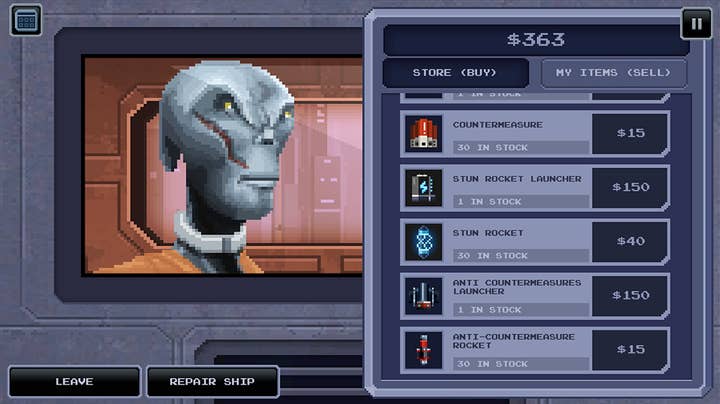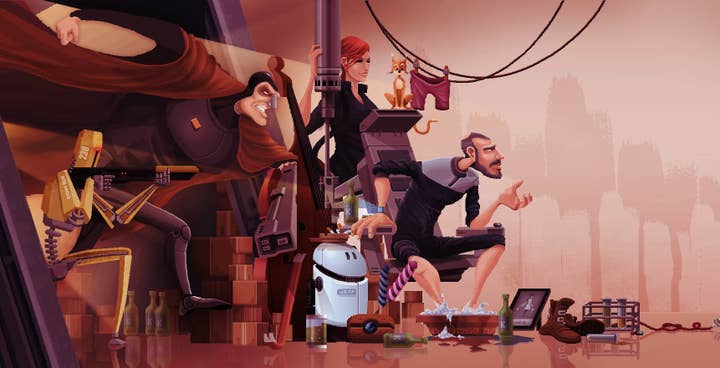The Captain leads Tomorrow Corporation into publishing
Kyle Gray explains how the sci-fi adventure inspired the studio behind 7 Billion Humans to do things it's never done before
The Tomorrow Corporation is the latest successful indie developer to branch out into publishing other developer's games, a move inspired by its first external project: Sysiac Games' The Captain.
A sci-fi adventure game developed by the Swedish studio's two-person team of Peter Hedin and Benny Eriksson, The Captain puts players in the role of Spacefleet Captain Thomas Welmu as he races from unknown parts of the galaxy back home to save Earth from imminent destruction. Players can choose their own route back, each leg of which will have different problems and moral dilemmas to solve, as well as different outcomes.
Speaking with GamesIndustry.biz, Tomorrow Corporation co-founder Kyle Gray says the company decided to move into publishing specifically because of this game. Fellow Tomorrow Corporation co-founder Kyle Gabler fell for The Captain years ago, when it first landed support from Indie Fund (of which Gabler is a member).

"He told me he wished we had gone back in time Terminator-style and wiped out Sysiac Games to make this game ourselves," Gray says. "He was really impressed by it."
When the technical and ethical logistics of time travel assassination proved unfeasible, Tomorrow Corporation settled for the next best thing.
"We got into publishing because of this game," Gray said. "If we couldn't make it, at least we could publish it."
To that end, Tomorrow Corporation has been helping The Captain make it to launch, working with storefronts, dealing with press and marketing, translating it, and "generally giving it the approach we do for our own games," Gray says.
In fact, Tomorrow Corporation is arguably doing more for The Captain than it has ever done for its own games. During a phone interview in advance of the self-publishing announcement, Gray says he hasn't done a live interview in over a decade.
"We've probably been one of the laziest developers out there when it comes to PR and marketing. Hopefully in a good way"
"We've probably been one of the laziest developers out there when it comes to PR and marketing," Gray says. "Hopefully in a good way. So even talking to you ahead of time is something we've never experimented with, mostly because we've had our heads down just making the game."
We offer Gray the opportunity to say something about Tomorrow Corporation's publishing prowess that might be a little more reassuring to its new development partners.
"Over the years, I'd like to think because we make good games, we make different games, and we have great relationships and a trusting fanbase built almost entirely on our work and Kyle's previous effort that we've assembled a growing list of contacts and best approaches," Gray says. "And we're trying to optimize that to the fullest extent.
"We've done pretty well. We've survived for 12 years doing things the way we've done them. And at least for The Captain, we're going to give it a better treatment than we have for any of our existing games, as far as PR, marketing and outreach. Every game we've tried to build on things we've done in the past, and I think this is no exception. I'm hoping this will be the best launch of any game we've worked on or worked with."
And unlike a number of other successful developers-turned-publishers, Tomorrow Corporation isn't leaning on outsourcing firms to handle the core services it's providing.
"We're basically doing pretty much everything in-house, outside of a few professional translators or localizers," Gray says. "We actually depend a lot on our fans and our connections to help us get the word out or translate the game. We've had people in a few of the languages we translate to who've been translating our games since Little Inferno.
"It's really nice to talk to them every few years. They're just completely volunteer translators, some of which have oddly enough met and formed friendships through translating our game. We get by a lot with help from our fans."

It's not uncommon for indies to solicit fan support for things like translations, but does the practice become exploitative when a studio like Tomorrow Corporation gets that free help from fans to help it fulfill a service it is providing to another developer?
"That's a good one," Gray concedes. "It's tough to say. With every game we've put out the word to see if anybody wants to help us translate. Sometimes the same people respond and sometimes they don't and we have other people. I think it's pretty commonplace as an independent developer to get help in non-standard ways. A lot of the times the fans do a better job because they actually play the games and they get into them and know our sense of humor.
"We have occasionally contracted one or two companies and the work just hasn't always been as good. You get the sense there's somebody who takes your writing, plugs it into a spreadsheet and is going through string by string. They're not getting the sense of humor, they're just dialing it in. Whereas the fans we have worked with are really passionate and into games, so for them, they really get a better idea of what our games are about.
"The Captain is a different undertaking in that regard because it's not directly our game. But we ask and we see who shows up. I don't know; I guess we just have a very good, supportive community. And I think as an independent developer effectively working on a shoestring budget, I'm not sure if we'd be able to bring our games -- or certainly other people's games -- to a larger audience without that kind of help, just because the cost of translation is so high and the quality is so questionable."
"It's nice to be spinning a bunch of plates in the air. When you're focused on one thing for so long, it's nice to take a step back and maybe see the bigger picture"
Tomorrow Corporation consists of just three people -- Gray, Gabler, and Allan Blomquist -- and because they aren't bringing anyone on for The Captain, everything they do to support the game is necessarily taking away from time that could be spent on internal projects.
"When we decided we were going to do this, we sat down and we talked about it," Gray says. "The way a lot of studios work at bigger companies is you have people roll off one project and go on to another. We can fix it up somewhat so somebody is prototyping while other people are working on this. And a lot of the publishing tasks fall more onto my shoulders in that regard, but at the end of the day, we are separating our time [between our work and The Captain]."
That's not to say splitting time between the projects is solely to Tomorrow Corporation's detriment. The last game Tomorrow Corporation announced was Welcome to the Information Superhighway in 2018, and Gray agrees there's an advantage to mixing up the work load a bit.
"It's nice to be spinning a bunch of plates in the air," Gray says. "When you're focused on one thing for so long, it's nice to take a step back and maybe see the bigger picture, to focus on some other tasks for a while and come back refreshed."
He adds that the experiences of taking a longer view around publishing and promotion has made Tomorrow Corporation "reconsider some of the approaches we've had in the past," so its likely the company's future projects will be informed by its work with The Captain.
However The Captain performs, it sounds unlikely that this would be the beginning of the next Devolver-like indie publishing powerhouse, especially when all of Tomorrow Corporation's work releasing other people's games functionally comes at the expense of work on its own titles.
"For us it would be an issue of the right game, the right fit, something that fits more in line with our sensibility," Gray says. "Kyle is basically our creative director here and he's got his own perspective and sense of humor so it has to be something that matches up with that; we're not going to go out and publish a first-person shooter, for instance. But we're all big fans of retro adventure games."

